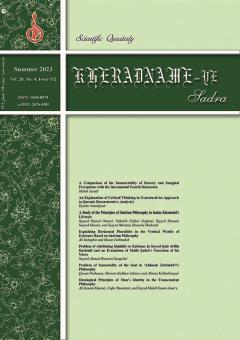-
-
List of Articles
-
Open Access Article
1 - Editor's Note
S. Mohammad Khamenei -
Open Access Article
2 - A Comparison of the Immateriality of Sensory and Imaginal Perceptions with the Growing Block View of Time
Mahdi Assadi -
Open Access Article
3 - An Explanation of Critical Thinking in Constructivist Approach (a Qur’ānic Deconstructive Analysis)
Heydar Ismailpour -
Open Access Article
4 - A Study of the Principles of Sadrian Philosophy in Imām Khomeinī’s Lifestyle
Sayyed Hamed Onvani Vahideh Fakhar Noghani Sayyed Hossain Sayyed Mosavi Sayyed Mortaza Hosseini Shahrudi -
Open Access Article
5 - Explaining Horizontal Pluralities in the Vertical Worlds of Existence Based on Sadrian Philosophy
Ali Sedaghat Hasan Fathzadeh -
Open Access Article
6 - Problem of Attributing Quiddity to Existence in Seyyed Ṣadr al-Dīn Dashtakī and an Evaluation of Mullā Ṣadrā’s Narration of his Views
Seyyed Ahmad Hosseini Sangchal -
Open Access Article
7 - Problem of Immortality of the Soul in ‘Allāmah Ṭabātabā’ī’s Philosophy
Ghasem Pourhasan Hossein Kalbasi Ashtari Alireza Kolbadinezad -
Open Access Article
8 - Ontological Principles of Man’s Identity in the Transcendent Philosophy
Ali Zamani Kharaei J‘afar Shanazari Seyyed Mahdi Emami Jome‘e
-
The rights to this website are owned by the Raimag Press Management System.
Copyright © 2017-2026







